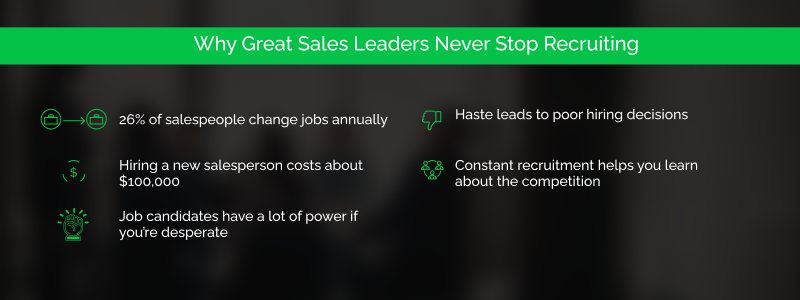Why Great Sales Leaders Never Stop Recruiting

You’re never done building a sales team — constant recruitment safeguards productivity and resources

You read countless resumes. You interviewed dozens of prospects. You hired the top candidates. You onboarded and trained them, and now, your sales team is a lean, mean selling machine. They understand your product and services. They fit with your organizational culture. And they’re posting great sales numbers. Now, it’s time to relax, right?
Nope. Building your sales team was just the first step. If you want to be successful, you have to keep recruiting. You shouldn’t wait until a salesperson leaves to start the recruiting process. Instead, you should actively engage in the recruitment process at all times.
Here’s why great sales leaders never stop recruiting — even when they feel like they’ve already built the perfect team.
Some of your salespeople will quit this year
You offer great pay and benefits and provide sales team members professional development. You nurture strong connections between management and team members, and the sales team seems happy. Unfortunately, even if all of these statements are true, some of your salespeople are still likely to quit this year.
On average, the sales industry has a 26% annual turnover rate. In other words, one in every four salespeople is likely to quit this year. Even if you work hard to keep your turnover rate as low as possible, you need to assume that some of your team will jump ship. They may find better opportunities at other companies, or they may need to leave for personal reasons such as family changes, their spouse’s job, or just because they want to go in a different direction with their career.
Regardless of how hard you work to protect retention rates, there’s always a risk of losing salespeople. But if you’re actively recruiting, you’ll be ready when it happens.
Turnover threatens productivity and profits
If you aren’t actively recruiting salespeople at all times, you’ll end up scrambling every time a salesperson leaves the company. The more time you need to draft a job ad, review resumes, and interview candidates, the longer that unfilled hole in your sales team will be sitting there.
You will lose sales during this time, and depending on the size of your sales team, this can put a significant dent in your revenue. The effect will be even more pronounced if you lose a top salesperson or if someone leaves without putting in notice. On top of missing out on sales, you will incur turnover costs.
On average, it costs businesses about $100,000 for every salesperson they lose. If you can shorten recruitment, streamline onboarding, and lean on well-organized training programs, it’s possible to cut these costs. You can also mitigate lost sales by shortening the time it takes to hire a new sales rep when someone leaves.
Your desperation gives too much power to job candidates
While you want to offer competitive wages and benefits, you don’t necessarily want the ball to be completely in the job candidate’s court, and it will be if you’re desperate for help. When you need to hire someone quickly, you give prospects a lot of leverage. They know you’re losing sales and that you’d probably do just about anything to add a quality salesperson to the team.
They may end up using this leverage to demand salaries, commissions, or benefits that greatly exceed the industry average or the pay rate for their skill set. In contrast, if you’ve been actively recruiting, you can just mine your pipeline for potential new hires. Because you’ve ensured that you have options, you don’t have to become desperate.
Lack of time puts you at risk of making poor decisions
When you have little time and feel desperate, you can make poor hiring decisions. Depending on the situation, you may end up hiring a candidate without vetting them thoroughly. Or you may lower your expectations so that you can find someone quickly. In some cases, a candidate may look great on paper, but you sense that they’re not a good cultural fit – yet you hire them anyway.
In a handful of cases, the poor fit may surprise you. They might learn the ropes and become a top seller, but that’s wishful thinking. Generally, hasty, desperate hiring decisions will hurt you in the long run.
The new hire will likely either burn through the job quickly, putting you right back to desperately looking for a new candidate. Or they’ll stay with the company and become a drain. When someone doesn’t have the right skills or the right cultural fit, they threaten to drag down the whole team.
Constant sales recruitment gives you learning opportunities
Active recruiters are always open to conversations. Even if you don’t have a position available, you should let prospects know that you’re always open for a no-pressure exploratory cup of coffee. This gets your name out, and it helps you develop connections with qualified salespeople. But beyond that, it helps you learn about your industry.
When you or someone from your HR team regularly meets with potential recruits, you learn about the top salespeople in your industry. You learn what they appreciate and dislike about their current employers. You get insights on salaries and bonuses. Ultimately, this helps you learn about the competition so that you can shape your offerings more effectively.
Constant recruitment helps you develop a pipeline of potential candidates. When someone leaves your company, you don’t have to start the sales recruitment process from scratch. Instead, you can reach out to known connections and see if they’re interested. This reduces the time, cost, and effort associated with recruiting new team members. It also safeguards your productivity levels and retention rates of new employees.
We can help. At MetaGrowth, we focus on helping clients build and develop world-class sales teams. Want to refine your recruitment process, streamline onboarding, improve training, and build the best possible sales team for your organization? Then, let’s talk — contact us today.
Written by
Joe Arioto
